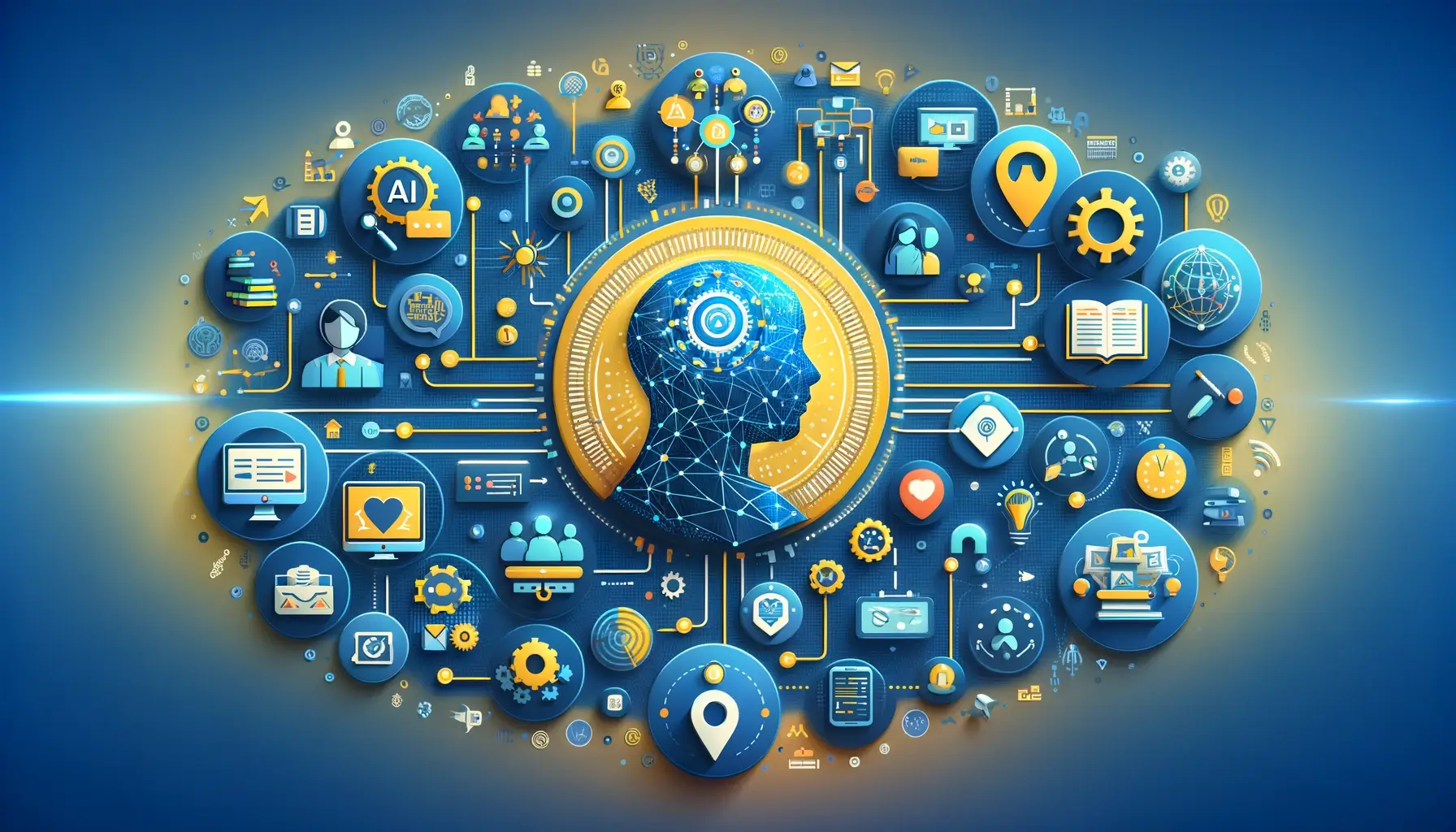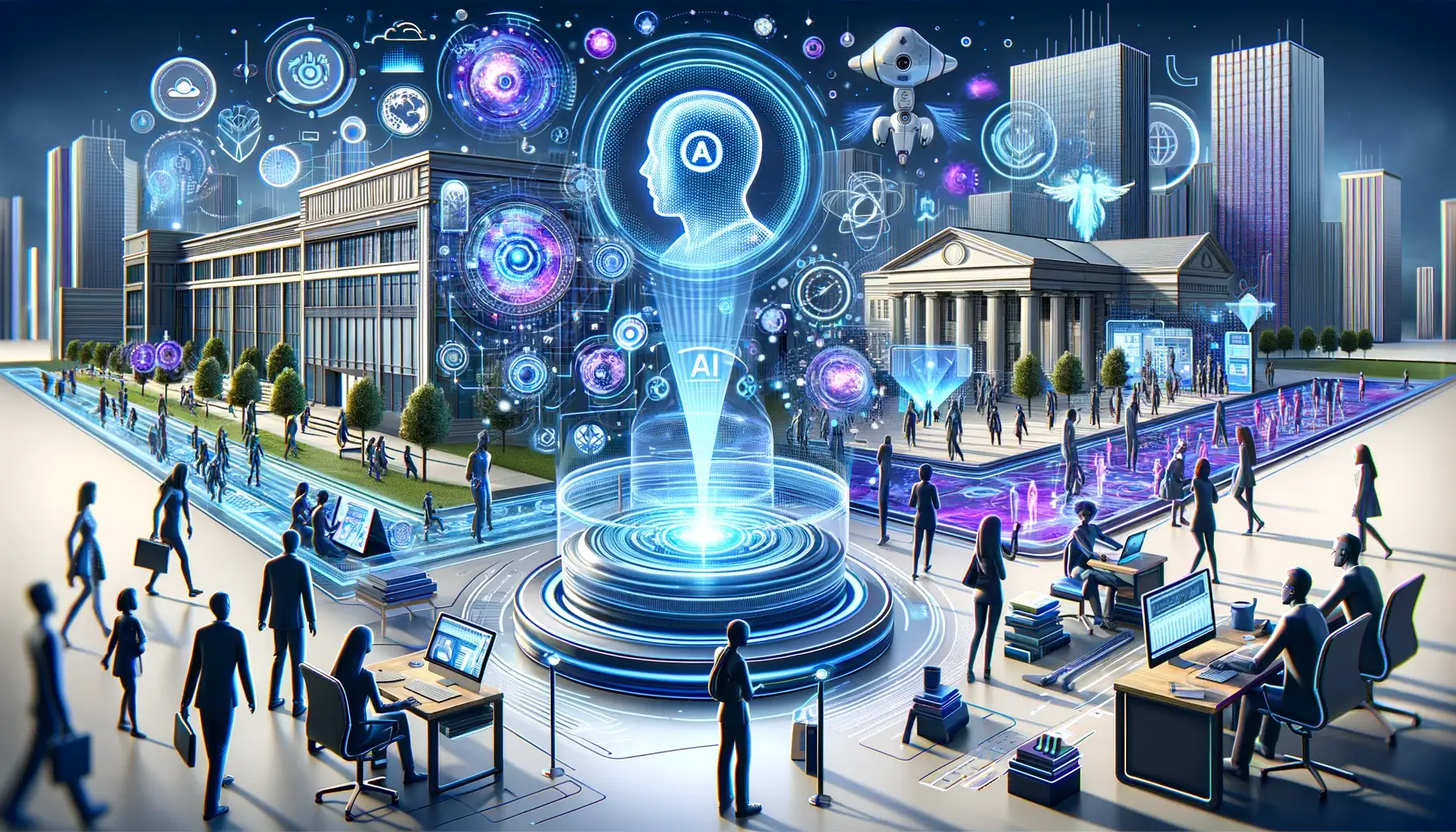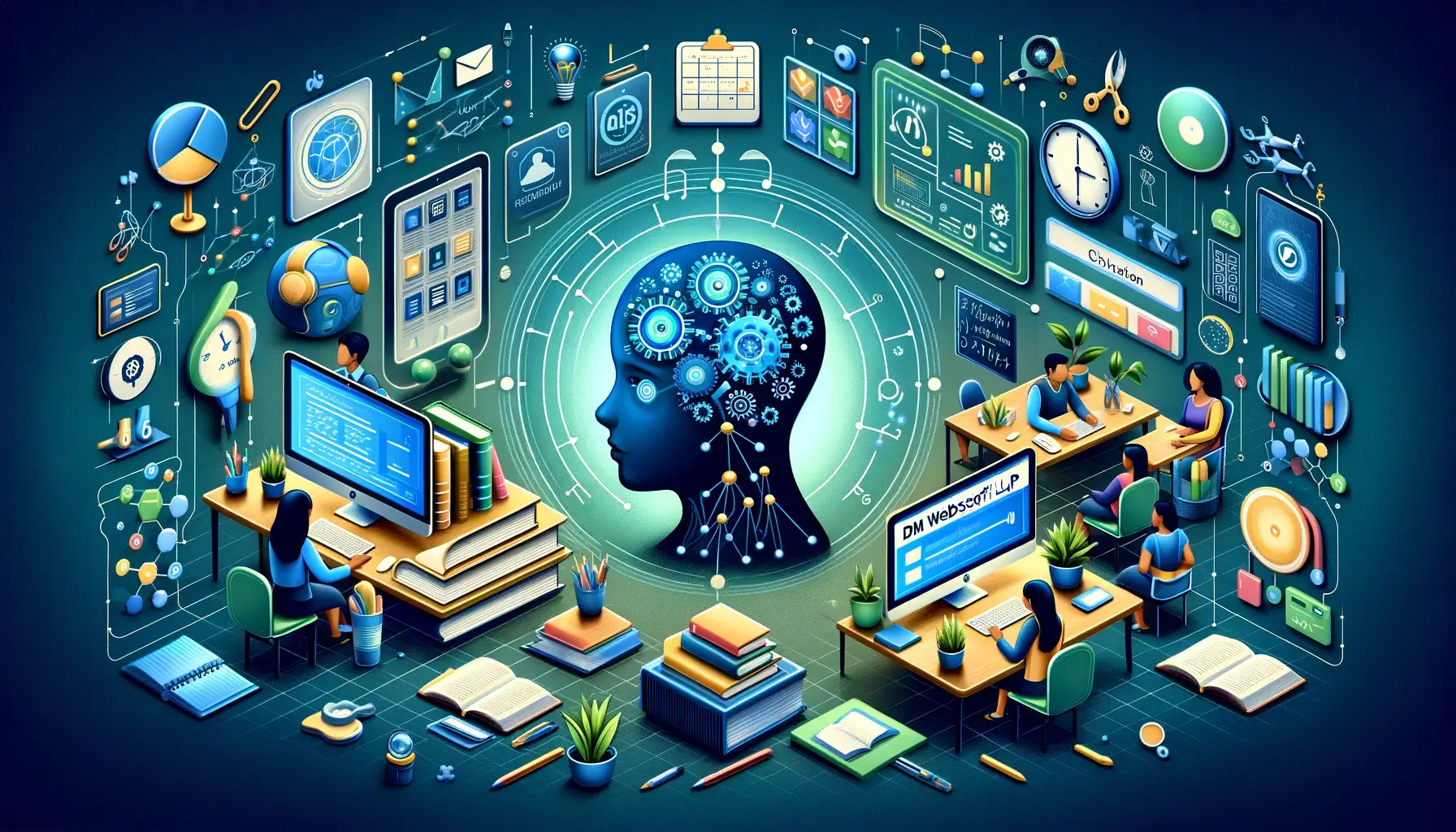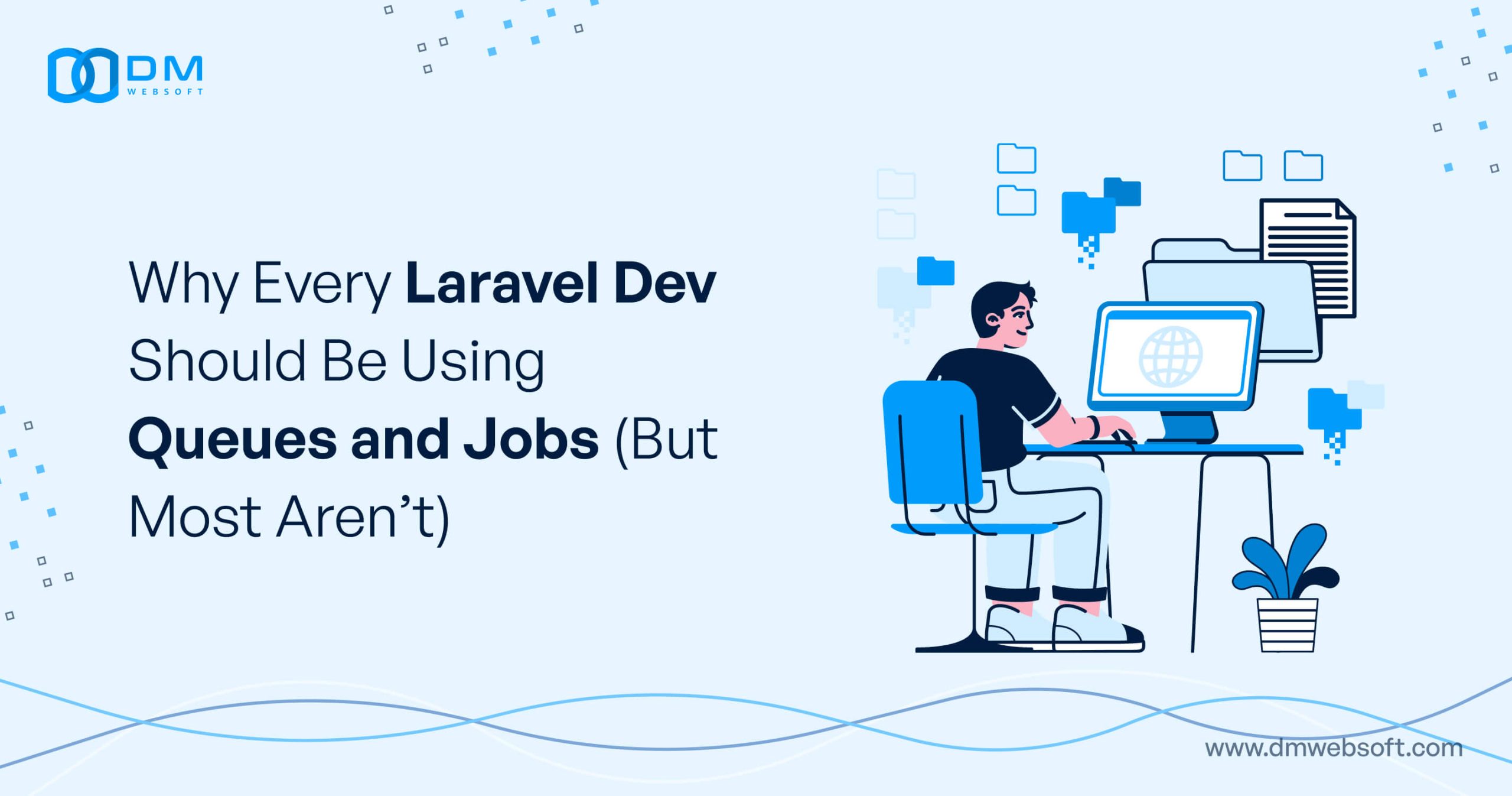DM WebSoft LLP exceeded our expectations! Their seasoned team of experts delivered a website that perfectly captures our brand essence. Their 15+ years of experience truly shine through in their exceptional web development skills.
TABLE OF CONTENT
Introduction
AI in Educational Administration: An Overview
Key Areas AI is Revolutionizing in Educational Administration
Benefits of AI in Educational Administration
Challenges and Considerations
The Future of AI in Educational Administration
DM WebSoft LLP's Innovative AI Solutions for Education
Conclusion
Get in Touch
Introduction
Artificial Intelligence (AI) is an emerging force that will be responsible for centralizing administrations of educational systems, aiding in better decision support, and helping to personalize learning experiences in the ever-changing scope of educational administration. This digital metamorphosis is represented in the form of an integration of AI-systems and tools, offering the administrative backbone of educational institutions a new look. It means it opens avenues for more efficient, data-driven, student-centric management practice.
DM WebSoft LLP, with its profound expertise in AI technologies, stands at the forefront of this transformation. Specialized in the domain of AI Solutions’ integration within the educational sector, DM WebSoft LLP leads the revolution of the educational administration through the provision of innovative applications capable of optimizing processes, enhancing financial management, and improving students’ engagement and outcomes. Through this implementation, DM WebSoft LLP tries not only to resolve the intricate issues that are cropping up for the educational administration but at the same time tries to make a base from which, in the coming years, the education systems are able to become more supple, flexible, and focused on student success.
In this article, we delve deeper into the role of AI in Educational Administration and take a look at how AI-driven solutions are revolutionizing the major focus areas of Student Information Management, Admissions, Tracking of Performance, and Financial Planning. Thus, this blog post aims to enlighten the transformation being brought into educational systems through AI with the innovative work and vision of DM WebSoft LLP, focusing to describe the benefits and highlight the challenges of AI integration.
AI in Educational Administration: An Overview

The meaning of artificial intelligence (AI) in educational administration is a mechanism applied to enhance the operation of entities in the educational sector through learned machines, data analysis, and intelligent automation that eases and increases the efficiency of business processes. This revolutionary approach aims not at displacing human capabilities but at aiding them with intelligent systems able to analyze huge data volumes, execute routine activities automatically, and prompt as reminders for proper decision-making.
Definition and Scope of AI in the Context of Educational Administration
AI in educational administration seeks the use of sophisticated algorithms and computational processes to optimize the various facets of administration in the institution: this includes the process of admission, scheduling, student information management, and financial operations, among other things.
It goes far beyond simple mechanization to embrace predictive analytics through enrollment forecasting, AI-based learning path personalization for students, and intelligent resource management. AI integration empowers education administrators to handle some complex challenges in the most efficient manner, from student engagement to improvement or optimization of budget allocations.
The Shift Towards Digital Transformation in Education
Education is one of the areas where we have seen a huge lot of transformation through digital means, based on the necessity to change with different educational requirements and also based on some very advanced new technologies.
In fact, the move toward digitalization could be noticed in the rise of online learning platforms, the digitized nature of course material, and virtual classrooms. Here, Artificial Intelligence plays a pivotal role in empowering educational institutions so that they can manage this kind of digital ecosystem. Further, these digital platforms easily transition into using an AI-driven system due to the automation of administrative processes, translating to little manual work and minimized possibilities of errors. For example, AI can schedule a class at the right time and allocate all resources required, such as facilities and personnel, so that the class optimally gets scheduled.
In addition, it was also added that AI technologies would be used for the analysis of data from digital learning platforms with the aim of identifying trends regarding student performance, something that would be a useful tool for administration and educators to tailor educational strategies based on individual needs. This shift towards digital transformation in education, powered by AI, underscores an increasing understanding of how it’s a very strategic response to the shifts taking place within the educational landscape.
This puts institutions on the path to getting enabled to remain both competitive and responsive to the needs of students in an increasingly digital world. The role AI would be playing in the administrative functions of these educational institutions grows more significant with the shifting times, ensuring this will further streamline educational administration as a data-centric operation, for the students’ personal experience improvements.
Key Areas AI is Revolutionizing in Educational Administration

How Artificial Intelligence (AI) transforms the landscape of educational administration: Hint: It influences several key spheres with a more efficient approach based on data and individual needs of a student. Which of the named areas in educational management seemed to be more amenable to evolutionary rather than revolutionary influence of AI?
Student Information Systems (SIS)
New systems in place for school management integrate AI in the processing and accessing of data for the students. SIS can provide analytics that are predictive of students’ behavior and outcomes, hence making possible early intervention in the case of those students that are at risk through AI. AI-oriented algorithms also take care of various administrative tasks, such as maintaining records of attendance and grades recorded, therefore liberating the educators to focus majorly on teaching instead of paperwork.
Admissions and Enrollment Management
In the admission and enrollment management field, AI is at the lead, right from enabling these processes up to making them tailor-made in dealing with the students. This can quickly screen through the many applications and point out the ones which would suitably match the criteria of the institution most accurately. It would allow potential students to receive tailor-made information and counseling based on his or her interests and profile, thereby ensuring more efficient and successful recruitment.
Personalized Learning Plans and Student Performance Tracking
AI leads in personalizing education through adaptive learning technologies. These are methods of assessing the learning style, preference, and performance of individual students in order to appropriately customize educational content. On the other hand, AI performance tracking tools may analyze data for a longer period to identify trends in students’ learning and, hence, the change of instruction and interventions aimed at providing the best learning outcome for the students.
Financial Management and Budgeting
Applying artificial intelligence to financial management and budgeting, the educational institution will define anew its resource allotment. In this view, the work shows how the use of artificial intelligence can predict future financial scenarios of the institution through different enrollment rates, among others, and changes in government funding. Which gives the administration a greater room with more transparency for the decision-making process in the issues related to budget, in support of financial sustainability and resource optimality.
Facilities and Resource Management
AI can play a very significant role in the optimization of usage of physical resources and facilities. Use of AI and its intelligent scheduling systems would optimize the space, allowing for more use of the same space rather than building extra buildings, hence saving on costs. Energy management systems will be powered by AI, able to analyze usage patterns and even suggest real-time adjustments to heating, cooling, and lighting in order to greatly cut down on energy consumption and its cost. In all these core areas, AI is doing more than simple operation and administration automation; it is rather revealing further values, as well as customer-appealing interpersonal experiences.
This actually is an educational administrative revolution bringing a change towards operational efficiencies; better management of financial resources; and, importantly, improvement in the educational experience of students. Further development and maturing of AI technologies could mean a deeper merging of AI in educational administration and, in general, still more revolution in the functioning and delivery of service at the institutions of education.
Benefits of AI in Educational Administration

The use of Artificial Intelligence (AI) in administration has been one of the shifts transforming the operational landscape of educational institutions. In this paradigm shift, a number of accruing benefits are expected in efficiency enhancement, decision-making process, personalization of experience, and financial management within the sector.
- Enhanced Efficiency and Productivity: Its useful automation does plenty of routine and repetitive work: from grading to scheduling, it offers a dramatic cut in time and effort taken by administrative and teaching staff. This, in turn, optimizes workflows, allowing the reallocation of resources to areas that might require a more individualized human touch. Besides, the amount of data that an AI system is able to process is enough to guarantee that even the administrative speeds can keep up with even more alert students and staff.
- Data-Driven Decision Making: The biggest advantage that AI is likely to make in administrative education is likely to be realized in the way it will help streamline decision-making via data. The interpretation could be to find trends and patterns from the results of huge and complex data sets that would have been indirect by traditional methods of analysis. This capability allows the administrators to make informed decisions in reference to curriculum development, allotment of resources, and offering support services to students based on hard data, rather than their hunches. For example, predictive capability could be used to identify potential droppers and hence facilitate timely intervention in student support.
- Personalized Educational Experiences: AI’s ability to process and analyze student data in real-time paves the way for personalized learning experiences. These even adapt the teaching methods for individual students and recommend courses while changing content according to the capability and learning style of every student. Such personalization reaches to even their personalized career counseling and support services, which entirely focus on making the educational experience of every student better.
- Cost Reduction and Financial Optimization: Financially, the integration of AI in educational administration has benefits that are very multifaceted. In fact, institutions can save much of their operational expenses by automation of routine tasks. In other critical areas, predictive analytics are very helpful in financial planning and budgeting to maximize spending against the forecasted trends in enrolment and staffing requirements, or facility utilization by the institution. On the other part, the AI can help discover the right, affordable strategies for allocation in terms of resources, energy management, and also maintenance—all toward the best way possible financial usage of resources.
In educational administration, AI would help show a way through which institutions can change their mode of operation and hence realize effectiveness, data-driven decision-making, and personalization of how administrative issues are dealt with in the education system. These AI advancements will directly contribute to reducing administration burdens, enhancing decisions, and transforming the overall way of administering institutions and the education received therein.
It is companies like DM WebSoft LLP, having expertise in AI integration, that are really proving the immense benefits that AI suggests for the educational sector. These set the basis for a future in which educational administration is not synonymous with resource management but, in fact, includes an issue: the development of the institution, where the appropriate application of imaginative solutions ensures an environment is created within which every student may flourish to the best of their ability.
Challenges and Considerations

The integration of Artificial Intelligence (AI) into educational administration does come with immense potential for transformation, but it also comes with its set of considerations and challenges. As organizations continue to grapple with the adoption of AI technologies, some of the main obstacles include ethical concerns, data privacy, and integration with existing systems. They also provide the opportunity for organizations to begin taking measures, such as offering comprehensive training and professional development for their employees.
Ethical Considerations and Data Privacy
Ethical considerations and data protection are key challenges that came about with the integration. Educational administration using AI processes extremely large amounts of sensitive and personal data and therefore raises significant issues in privacy, consent, and security. The systems of AI that are designed and operated by an institution should, therefore, ensure that they respect and never interfere into the privacy rights of the students and staff. That is enforcement of strong data protection, getting informed consent on what is collected and processed, and transparency on how the sharing of data will be taken advantage of by the AI algorithms.
Moreover, there is always a risk of AI systems accidentally perpetuating biases or giving discriminatory recommendations due to either incomplete training data or imperfect algorithms. Therefore, educational institutions are to come in line with the fact that the proper way of the adoption of AI solutions by this sector is by including observance of ethical AI practices through regular audits of the systems to avoid outcomes of a discriminatory nature.
Integration Challenges with Existing Systems
The largest challenge besides adopting these technologies into these learning institutions lies in integrating AI technologies with the existing technology infrastructure of these educational institutions. In most cases, the institution would be running into some legacy system, which the new solutions offered through AI may not easily adapt to. AI integration across the workflow, systems, and operations will require auditing them all and, in most instances, large-scale optimization efforts or even full replacement of most of them.
This integration process can be complex and costly, with careful planning and execution. It is, therefore, the duty of institutions to balance their quest for increased AI capabilities and realization within their current technology ecosystem and budgetary realities. Integration must be facilitated with simple steps, and it is going to happen only through a strategic approach that causes as little disturbance as possible to current operations but with as much enhancement possible through AI.
Training and Professional Development for Staff
It is believed that the institutional success in integrating AI into educational administration significantly depends on the level of development in human capital. Right from top-level administrators to educators, staff members working at various levels should be made aware of making effective use of AI systems.
There is need for comprehensive training and professional development programs that are critical to meet different user needs and competencies. Training programs should be related to technical issues of the work of AI tools and some other essential subjects, including general literacy about data, ethical issues, and the ways to implement AI into current administrative and educational practices. Staff should be educated with an understanding of how AI systems can be effectively utilized and their potential and limitation should be known to them so that AI is used as a tool to augment human decision-making, not a replacement for it. Addressing these shall require collective efforts by educational institutions, technology providers, and regulatory bodies.
DM WebSoft LLP provides its immense support to navigate these challenges. With their expertise in AI integration and innovative solutions tailored to the unique needs and challenges of educational administration, their work underscores the transformative potential of AI in this field while emphasizing the importance of ethical, technical, and human considerations. The success of AI integration in educational administration will rely on a wise and collaborative approach to overcoming these challenges, ensuring that AI effectively enhances educational outcomes and operational efficiency.
The Future of AI in Educational Administration

The future of artificial intelligence (AI) in educational administration is on the verge of launching into a period characterized by great integration of technologies and innovative trends. The future will not bring just job automation but a radical rethinking and redesign of educational ecosystems to be much more efficient, responsive, and personalized. The developing AI technologies and their application within education, in the future, are set to change the game of how institutions run and relate to students.
Emerging AI Technologies and Trends in Education
- Natural Language Processing (NLP): This is an NLP technology that will enhance the way educational administrations can hold communication, both with the students and among the staff. They can include everything from AI-powered chatbots providing instant answers to student questions, or sophisticated systems being able to actually interpret open-ended student feedback—and more improvements are about to change the game of both student and educator communication in educational settings.
- Secure way of Data Management through Blockchain: What blockchain technology, together with AI, is the role bound to be played by major impactful toward the direction of secure management of records and credentials of education. Its application would ensure integrity and verifiability of the academic records, thereby making it possible for credits and recognition of qualifications to be easily processed between institutions on a worldwide basis.
- Predictive Analytics: Our powerful, advanced predictive analytics tools help to predict the trends of enrollment, success rates, and even potential risks for dropout. It will be an additional strong insight for further resources’ efficient distribution by administrators, more individual interventions for students, and even more improvement of institutional planning and strategy.
- Automated Scheduling and Resource Allocation: AI systems are increasingly capable of managing complex scheduling tasks, optimizing the use of classrooms and resources. This not only maximizes efficiency but also contributes to a better learning environment by ensuring that facilities are utilized in ways that best support teaching and learning needs.
Predictions for AI’s Role in the Future of Educational Administration
- Better decision-making: AI will provide the cornerstone for the better decision-making processes within learning institutions. Such AI is bound to inform the very basis of policy decisions, curricular changes, and even resource allocations through the provision of data-driven insights that will ensure institutions are up to par with the new face of the re-emerging educational landscape.
- Scale up Personalization: The most powerful promise of AI in educational administration is the power it gives to scale up personalized education. This will enable institutions to scale personalized learning paths and services to include individual student needs, support strategies, and engagement for outcome improvement and student satisfaction.
- Access and inclusion to all across the world: The promising technologies of the present era, among them, to make quality education accessible and inclusionary, AI is the best one. With proper filtering of information, AI can open the world for many underserved communities and regions to break the orthodox notion of barriers and disperse education.
- Ethical and Responsible Use of AI: With more involvement in the administrative part of education within AI, there will be more focus on an ethical consideration and responsibility toward the use of the technology. In applying AI, it will be a priority for the institution to assure transparency and data privacy, in the ensuring that it works for the good of all students and staff.
The future of AI in educational administration is not just promising; it is transformative. And with the various new technologies coming up with innovative applications, AI is all set to redefine how institutions of education are going to be on a more efficient, adaptable, and personalized front. With front-runners such as DM WebSoft LLP, companies that lead in integration and implementation of AI within educational setups, possibilities for improved administration and results are boundless. The emerging landscape ahead for AI in education is one of the frontier, full of possibilities to transform what is possible for engendering supportive, engaging, and inclusive learning environments.
DM WebSoft LLP's Innovative AI Solutions for Education

DM WebSoft LLP is the cutting-edge front of integration and innovation when it comes to the educational sector, dealing with the suite of innovative solutions customized to provide for academic administration revolution. Their expertise in the development and implementation of AI empowers the realization of transformative enhancements to operational management, how the institution interacts with the student, and decisions made at the strategic level.
Overview of Solutions Developed by DM WebSoft LLP
DM WebSoft LLP brings to the table a bouquet of AI-enabled tools that make the administration of institutions very seamless, helping primarily with enhancing the learning experience. Its AI-driven Student Information Systems (SIS) ease automation in record-keeping and also provide actionable insights in cases related to student performance and engagement.
Another stand-out solution is the admissions platform that uses AI. It does this by eliminating, on an automatic basis, screening and filtering of the applications, ensuring that no single individual candidate is looked at slower or with favoritism but with evaluation based on the totality of the presented materials. Realizing the importance of this personalization for the students, even DM WebSoft LLP also introduced an adaptive learning platform with AI personalized for individual student needs.
This is a platform that goes on to analyze learning habits, performance, and preferences of students so that a greater learning experience can be achieved for better outcomes through the customization of lesson plans and resources.
At DM WebSoft LLP, resource management employs AI-based algorithms that predict trends in enrollment and facility usage, providing insight that allows institutions to derive the most out of their resources and plan for future needs. In addition, financial management systems of institutions use AI in scrutinizing spending trends in order to be in a position to identify areas from which institutions might cut possible expenditure and help in optimizing budget allotment.
How DM WebSoft LLP is Addressing Challenges in Educational Administration
DM WebSoft LLP’s Artificial Intelligence solutions are to struggle with the various challenges that educational administration is facing, with its administrative systems meant to take a lot of workload off the staff through automated technologies, facilitating them to do more strategic tasks and less day-to-day operations. This higher level of efficiency will save time and cut the potential for human error in processes like enrollment and scheduling.
Data privacy and security are paramount in DM WebSoft LLP’s AI solutions. In other words, it ensures safety through the latest encryption and security protocols of data, making sure that both student and institutional information is secure. In addition, their AI systems are equipped with inbuilt bias detectors and correction algorithms, making sure that justice and fairness, with a sense of equity, are accorded in all aspects of administering students.
Others are areas in which DM WebSoft LLP really shines, including: integration with prevailing systems. Its AI solutions are designed in a way that they integrate with an array of educational software and platforms, hence when being installed in the institution, there will be smooth execution which will not interfere with activities already taking place. They also provide comprehensive training and support to ensure that staff can effectively utilize these new tools.
Looking ahead, DM WebSoft LLP is committed to continuous innovation in AI for education. They are also looking at emerging technologies in the form of natural language processing for improved communication interfaces and, more recently, blockchain for secure credential verification.
They see a future in which educational administration is not just a futuristic vision of AI streamlining operations but it becomes proactive in assistance to create much more engaging and effective learning environments. In essence, DM WebSoft LLP’s innovative AI solutions are at the vanguard of transforming educational administration. Not only do they help in tackling the current problems but also in predicting future needs, whereby they are increasing efficiency and effectiveness of educational institutions and the learning experience of the student, setting a new standard for what can be achieved in education with AI.
Conclusion
The implications that would come about from the involvement of Artificial Intelligence (AI) in educational administration are simply great and would be seen to largely revolutionize how the management of educational institutions, staff, and students is carried out. This blog tried to delve deep into the multifaceted ways in which AI is transforming and easing the administration of education, ranging from the kind of students’ information systems in place, personalized experiences, and financial management. All this gives a pointer to the positive gains, ranging from efficiency and data-driven decisions to personalized educational programs and, more importantly, the efficiency and streamlining of development and optimization of resources.
However, the journey toward fully integrating AI within educational systems is not without its challenges. These issues will include ethical considerations, data privacy issues, the necessity of seamless integration with present infrastructures, and ensuring through each way of its operation that the staff are prepared and trained to embrace new landscapes of technology. Hence, realization of the fullest potential of AI in education would call for concerted efforts among all players to embrace and address these challenges.
In this transformative landscape, DM WebSoft LLP emerges as a beacon of innovation and expertise. The development of next-gen AI solutions for educational administration is therefore meant not only to fix the prevalent operational inefficiency but also to prepare for an age where administration in education becomes more accessible, personalized, and effective. Facing the daunting challenges by innovating constantly to make a difference in the future of education is what DM WebSoft LLP is doing.
The potential for AI in educational administration extends beyond operational efficiencies. This bodes transformation in the approach to teaching and learning, making education yet more sensitive to individual student needs and preparing learners for a fast-changing world. As such AI technologies continue to emerge, it is clear that they will become a part of the system of education and offer more chances toward educational improvement of outcomes and performance within these institutions.
Looking ahead, the role of AI in educational administration is set to expand. As machine learning, natural language processing, and predictive analytics continue to flourish, AI will offer gradually increasing powerful tools for running educational institutions. The future of AI in education is where data informs every decision, educational experience tuned for the need of each learner, and the administrative tasks are even invisible.
Thus, AI makes the role of AI in educational administration very comprehensive and transformational. And institutions like DM WebSoft LLP, with their expertise and innovative solutions, are at the forefront in driving change that indeed promises the redefinition of educational administration.
What is important is to embrace this future, putting emphasis on how AI can be used in enriching an educational experience for all and to use technology as a bridge toward a more inclusive, efficient, and personalized system of education. This is an integration of AI in education which has really just begun, but the promise it gives for implementation is yet to be seen. The promise is boundless and quite exciting.
Overall, AI plays a big role in improving the administration in education, dealing with the automation of processes, analyzing big data for insights, personalizing the learning experience of every student, and finally optimizing finances and resources in the organization. Informed decision-making, improved efficiency, and personalized education pathways are part of the deal.
Various AI applications in educational administration include AI-driven student information systems for management, admission platforms, which ensure easy and convenient means of enrolment, learning tools for the adaptation of education, and predictive analytics for financial planning and resource allocation.
It will allow the educational institution to reap the benefits of better operational efficiency, data-based insights for clear strategic planning, personalized learning and educational experiences for students, and cost savings emanating from substantial savings due to optimized resource utilization.
These can be challenges in ensuring ethics, protection of data, and fluid integration of the technology with current educational infrastructure. Ensuring there is enough training and staff development that would enable the use of the appropriate technologies related to AI can also be the other challenges.
DM WebSoft LLP—standing for the pioneer in AI use for educational administration with new age innovations by integrating AI for operational efficiencies in administration, student learning improvements, and industry challenges so that AI can be addressed to provide AI-based solutions. Their experiences have let them keep in tune with the latest and AI technologies to keep the future driving.
Get Started Now !
What’s the Process ?
Request a Call
Consultation Meeting
Crafting a Tailored Proposal
Get Started Now !
Real Stories, Real Results. Discover What Our Clients Say

Working with DM WebSoft LLP was a game-changer for our business. Their technical prowess and innovative solutions transformed our online presence. A highly recommended web development agency with a stellar track record.

We are thrilled with the results DM WebSoft LLP delivered. Their deep understanding of web development coupled with years of expertise ensured a seamless and visually stunning website. True professionals!

In a digital age where first impressions matter, DM WebSoft LLP crafted a website that speaks volumes. The team’s attention to detail and commitment to quality set them apart. Thank you for making our vision a reality.

DM WebSoft LLP’s team demonstrated unparalleled expertise. Their ability to navigate complex technical challenges with ease is truly commendable. Choosing them for our web development needs was the best decision.

Exceptional service, unmatched skills! DM WebSoft LLP stands out as a leading web development agency. Their collaborative approach and commitment to excellence make them our go-to partner for all things web-related.

DM WebSoft LLP turned our ideas into a digital masterpiece. The seamless communication and timely delivery of our project showcased their professionalism. Highly impressed with the level of creativity and skill.

Our experience with DM WebSoft LLP was nothing short of amazing. From concept to execution, their team provided top-notch web development services. A reliable partner for businesses looking to elevate their online presence.

DM WebSoft LLP’s team of tech experts is second to none. Their wealth of experience reflects in the quality of their work. Our website not only meets but exceeds industry standards, thanks to their dedication.

Choosing DM WebSoft LLP was the best investment for our web development needs. Their team’s proficiency, coupled with a customer-centric approach, made the entire process smooth and enjoyable. A pleasure to work with!






